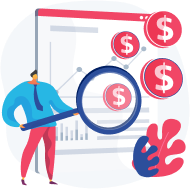HRMS Vs. Traditional HR Methods: A Comparative Analysis
We help companies find the most suitable IT software and solutions, which reveal their HR challenges.
The management of human resources has advanced over the years, changing from traditional methods to HRMS.
What reasons support the notion that switching to human resource management system software is crucial?
Let’s discover.
Efficiency and productivity
To work in HR using traditional means, one would need to fill out too many papers and use pens a lot. Think about it: how interesting would it be for you to look through lots of CVs or correct information about employees typing with a pen on paper? Isn’t it boring? These are taken care of by the human resource systems that automate such tasks as hiring, integration, and salaries, using at most five clicks for everything else.
Cost-Effectiveness
At first, traditional HR methods may appear less costly since they do not require huge investments in expensive software. Nevertheless, there are hidden expenses, such as manual mistakes and noncompliance costs, for the companies. A human resource management system, or HRM software, has an upfront cost but leads to substantial savings in the long run. It has been proven that companies from Bahrain, Kuwait, Oman, and Qatar can reduce their operating expenses by using HRMS.
Accuracy and error reduction
Typing manually easily results in mistakes. Making errors in payroll records, misplacing employee documents, and breaching some rules may cost a lot. But don’t worry, because all data entry is done automatically in the modern HR systems that prevent any such miscalculations mentioned above. With the help of the HRMS, there is integrity of information, reducing the number of mistakes and enabling a smooth running process.
Scalability and flexibility
Can you rely on conventional HR methods while expanding your business? It is very difficult to increase scale through manual means. In contrast, human resource management system software is designed in such a way that it can easily be expanded. HRMS is adaptable, whether you are adding just ten or even a thousand employees at once. Also, it allows one to customize reports as well as procedures. In the case of companies situated in Saudi Arabia and the UAE, this ability to scale up and down is very important.
Data management and analytics
The era of big data relies on information for decision-making. Data-capturing capabilities are lacking in traditional approaches to HR. HRMS can pool together the data and provide up-to-date analysis and reports on it. You can see how the workforce is evolving statistically; identify any deficiencies within that workforce without forgetting to take some decisions hereon. By transforming information into actionable data, HRMS helps you stay ahead of the competition!
Performance Management
Tracking employee performance manually is not easy at all. Setting goals, giving feedback, and doing appraisals may get into a mess. However, human resource management systems simplify the monitoring of performance through setting goals and objectives, following progress, and providing feedback using only one interface. By promoting continuous improvement, HRMS ensures that workers remain motivated toward achieving company objectives.
Conclusion
It is strategic and not fashionable to change from the customary HR techniques to a human resource management system.
There are many advantages, such as increased effectiveness, financial savings, better measuring capabilities, scalability, business intelligence, and successful performance tracking systems.
We are aware of these requirements at Zoftware.
Throughout the GCC region, we assist SMEs and MSMEs in locating the most appropriate customized HRMS.
With Zoftware, your partner in IT excellence, you can discover, compare, and implement the best software.
When you upgrade your HR processes through HRMS, you make your human resource management future-proofed.
Be part of this movement today and experience the best offers on HRMS with us at Zoftware!




